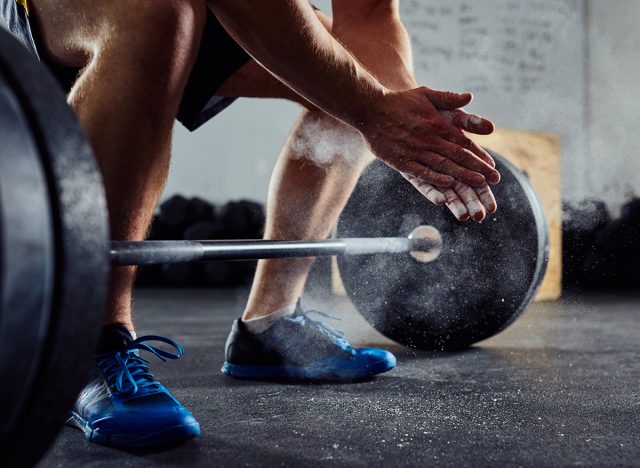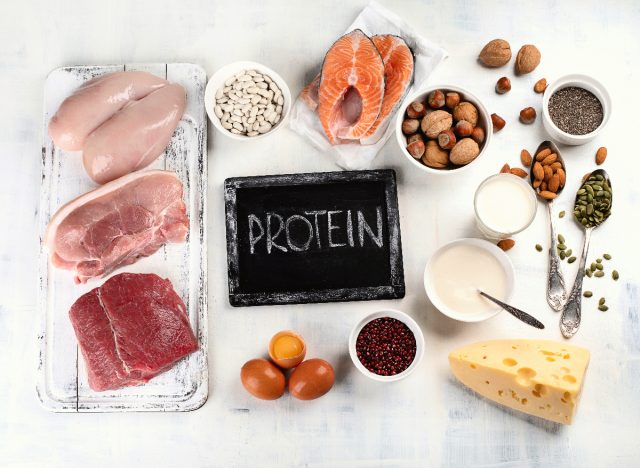9 Worst Daily Habits That Kill Muscle Growth

Achieving and maintaining muscle growth is a popular goal I see among many of my clients. While regular exercise and a proper diet are essential components of building muscle, certain habits can completely sabotage your progress. Today, I'm calling out nine of the worst daily habits that kill muscle growth so you know what to cut out of your routine ASAP.
If you're putting the time into the gym and following a protein-rich diet, you may not yield your desired results if you struggle with maintaining other muscle-building habits. For my clients who are looking to maintain muscle growth, here are the nine common habits that kill muscle growth, along with useful tips on how to avoid them. Keep reading to learn more, and when you're finished, don't miss out on these 7 Essential Exercises for Men To Prevent Muscle Loss After 50.
Ego lifting at the gym

Ego lifting, or lifting weights that are too heavy for proper form, is a common mistake you may make at the gym. This habit not only increases the risk of injury, but it also limits muscle growth. When you prioritize lifting heavier weights over proper technique, you engage fewer muscle fibers, hindering muscle stimulation.
Solution: Focus on lifting weights that allow you to maintain good form throughout the entire range of motion. Gradually increase the weight as your strength improves.
Being inconsistent with your training

Inconsistent training and nutrition can lead to muscle loss or stagnation. Muscle growth requires regular stimulation and adequate nutrition over time.
Solution: Establish a consistent workout schedule, and stick to it. Plan your meals to ensure you meet your nutritional needs consistently.
Neglecting leg day

Many individuals focus on training their upper body while neglecting their lower body. This habit can lead to muscular imbalances and hinder overall muscle growth.
Solution: Prioritize leg day to work on your quadriceps, hamstrings, glutes, and calves. Strong legs not only improve your physique but also support your overall strength.
Not prioritizing compound movements

Compound exercises such as squats, deadlifts, and bench presses, engage multiple muscle groups simultaneously, making them highly effective for muscle growth. Neglecting these movements in favor of isolation exercises can slow down your progress.
Solution: Incorporate compound exercises into your workout routine. They provide a solid foundation for overall muscle development.
Following a diet that doesn't offer sufficient protein

Protein is the building block of muscles. If your daily protein intake is insufficient, your muscles won't have the necessary materials to repair and grow. This can hinder muscle development and recovery.
Solution: Consume an adequate amount of protein from sources like lean meats, poultry, fish, dairy, eggs, and plant-based options such as beans, lentils, and tofu.
Overdoing it with alcohol

Excessive alcohol consumption can have detrimental effects on your overall health and muscle growth. Alcohol can dehydrate your body, impair muscle recovery, and reduce testosterone levels.
Solution: Limit alcohol intake, consume it in moderation, and stay well-hydrated when you do indulge.
Not getting enough restful sleep

Sleep is when your body repairs and grows muscle tissue. Insufficient sleep can lead to increased stress hormones, reduced muscle recovery, and impaired muscle growth.
Solution: Prioritize quality sleep by maintaining a consistent sleep schedule and creating a sleep-friendly environment.
Not managing stress effectively

Chronic stress can lead to elevated cortisol levels, which can contribute to muscle breakdown and hinder growth. High stress levels also affect sleep quality and your overall well-being.
Solution: Incorporate stress-reduction techniques such as meditation, deep breathing exercises, or yoga into your daily routine.
Overtraining

Excessive exercise without sufficient rest can lead to muscle fatigue, injury, and decreased muscle growth. Muscles need time to recover and adapt to training stimuli.
Solution: Allow your muscles to recover by incorporating rest days into your workout routine. Listen to your body, and avoid pushing yourself to exhaustion.









